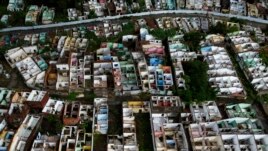27 March 2022
In northeastern Brazil, the capital of Alagoas state used to be filled with the sounds of busy city life: cars and buses going to places of business, people enjoying daily life, and children playing.
But now, the capital Maceio is quiet.
Most residents have been evacuated. They have left because their now empty houses are falling apart and face destruction.

Homes stand abandoned in Maceio, Alagoas state, Brazil, Sunday, March 6, 2022. The homes have been abandoned because of the threat of ground subsidence caused by the Braskem mine that has forced more than 55 thousand people from their homes. (AP Photo/Eraldo Peres)
Beneath their floors, the ground is filled with empty spaces from four decades of rock salt mining in urban neighborhoods. That caused the soil above to settle and the structures atop the soil to start coming apart.
Since 2020, tens of thousands of residents accepted payments to leave the area from petrochemical company Braskem.
But some residents remain in Maceio. Some told the Associated Press they imagine the ground under their feet to look like "Swiss cheese," meaning full of holes.
Still, Paulo Sergio Doe said he will never leave his home in the Pinheiro neighborhood. It is where he grew up.
"The company cannot (can't) impose what it wants overnight to do away with the lives and histories of so many families," the 51-year-old resident said in an interview outside his home.
Braskem is one of the biggest petrochemical companies in the Americas. It is owned mostly by Brazilian state-run oil company Petrobras and construction giant Novonor.
The company is not forcibly evicting anyone. But those remaining in Maceio said it feels that way. Braskem reached an agreement with prosecutors and public defenders to compensate families. This money was to help them relocate and start their lives over elsewhere. By the company's count, 97.4 percent of affected homes — more than 14,000 — are now empty.
The 55,000 evacuees left behind not just neighbors and friends, but also jobs. Last year the Federal University of Alagoas published a study. It found that 4,500 mostly small- and medium-sized businesses were closed. These businesses employed an estimated 30,000 people.
Among those businesses were local food markets and a ballet school that had operated for 38 years, said to Adriana Capretz. She is part of the university's work group that keeps details on the neighborhoods.
The emptiness of the city is clear from above. The residents who left sold everything they could for extra money. This included the roofing material of their homes. Without the roof tiles, from above you can see clearly inside the once-lived-in houses.
The amount of money Braskem offered to compensate 77-year-old retired teacher Natalícia Gonçalves is not enough. She said she was too old to start over somewhere else. So, she watched as everyone in Pinheiro left her.
Now she lives inside a homemade shelter behind boards and plants. These are aimed at preventing would-be thieves. Braskem security guards patrol the city on motorcycles at night. This briefly breaks the city's strange silence.
"They've already done everything to force me to go, but I have my rights," she said from behind her home's protected outside barrier. She said she is especially afraid at night when no one is around and there is not much light. "I protect myself with my plants," she said, "but I'm alone, with God."
As of yet, no house has been swallowed by the earth, nor has anyone been killed by a collapse. However, Capretz, a professor in the university's architecture and urbanism school, said that does not mean this is not a tragedy.
She explained that many people have become sick with depression. Some residents have killed themselves. Many have "... lost their social lives, family ties, friends and neighbors," Capretz said as she walked through the Bebedouro neighborhood. "None of that is being considered by Braskem."
Sitting at a table beneath the light of the street's only working lamppost, 64-year-old Quitéria Maria da Silva and her grandson wait for the rest of their family to play a game of dominos.
Even as da Silva said she would move were Braskem to pay her requested amount, she is left with a big question: "I always lived in my house and now, if I have to leave here, where will I go?"
The company's press office said in a lengthy response to AP questions that it provides free mental health services to any resident in the compensation and relocation program. It said the program was created based on law and legal rulings in similar cases. The company added that compensation offers are always presented to individuals alongside their lawyer or a public defender.
But these offers can be made more complex by intense feelings. The price of a house is not the same as the value of a home.
I'm Jonathan Evans. And I'm Anna Matteo.
Eraldo Peres and David Biller reported this story for the Associated Press. Anna Matteo adapted it for VOA Learning English.
__________________________________________________________________
Words in This Story
evacuate - v. to leave or cause to leave a place of danger
resident - n. living in a place for some length of time
impose - v. to establish or apply by authority
evict - v. to recover (property) from a person by legal process
compensate - v. to give money to make up for something
relocate - v. establish in a new place
thief - n. one that steals especially stealthily or secretly
patrol - v. the action of going around an area to make sure that it is safe